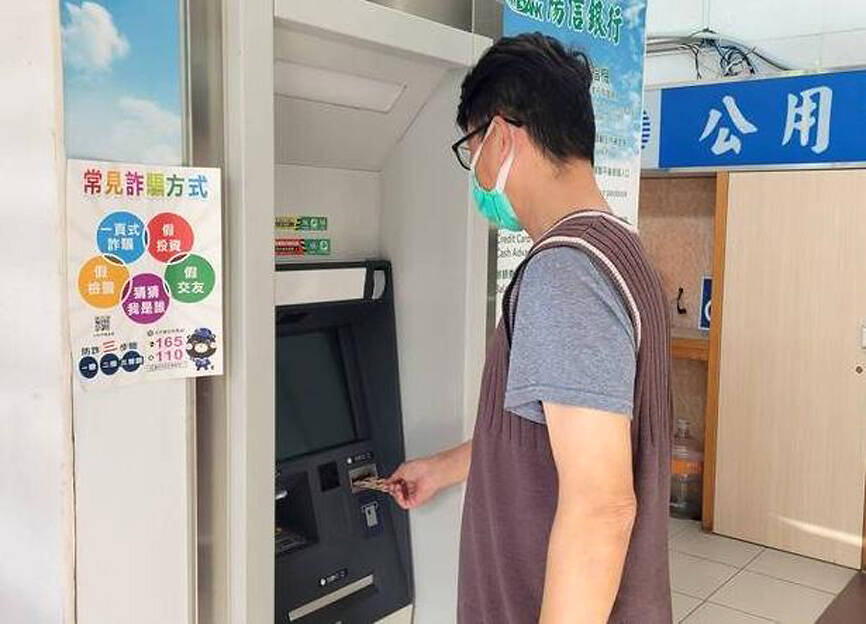The Criminal Investigation Bureau on Sunday released a list of the nation’s top 10 ATM scam hotspots for the first half of the year, saying that such cases peak at about midnight and midday.
ATM-related scams have become increasingly prevalent in recent years as fraudsters continue to diversify their tactics, the bureau said.
Victims are often misled into believing they are transferring funds to cancel an installment plan or settle an online purchase, after which a “money mule” is dispatched to withdraw the cash from an ATM.

Photo: Wang Mei-hsiu, Taipei Times
According to bureau data, money mules typically operate at about midnight or 1pm, and are often identifiable by wearing a mask throughout the transaction, frequently switching ATM cards and spending an unusually long time — five to 10 minutes — at the machine, the bureau said.
Scam-prone ATMs are usually located in areas with high foot traffic, such as near highway interchanges, MRT stations or in open spaces on university campuses, allowing mules to “withdraw and run” without drawing attention, the bureau said.
The top 10 scam hotspots are Neipu Xuefu Post Office in Pingtung County; Puzi Post Office in Chiayi County; Sanchong Zhengyi Post Office and the Taiwan Cooperative Bank’s Sanchong branch in New Taipei City; First Commercial Bank’s Ximen branch and 7-Eleven’s Xining South branch in Taipei; Hukou Post Office in Hsinchu County; Douliou Jhenbei Post Office in Yunlin County; Taipei Nanyang Post Office; and Cathay Life Insurance Co’s Sanxia Haishan service office in New Taipei City, the bureau said.
The hotspots range across northern and southern Taiwan, indicating that scam syndicates operate with careful planning, it said.
Some financial institutions have begun introducing measures such as warning messages, withdrawal limits and facial recognition technology at ATMs, it added.
For example, CTBC Bank and Mega International Commercial Bank have developed their own facial recognition technology to help prevent scams, demonstrating their sense of corporate social responsibility, the bureau said.
However, overall fraud prevention capabilities at ATMs nationwide remain insufficient, with only a small number able to effectively identify the behavior of money mules, it said, urging financial institutions to invest in the development of such technologies.
Banks are on the front line of protecting people’s property, and every abnormal withdrawal that is promptly detected and reported can prevent a potential tragedy for a family, the bureau said.
People working as money mules are considered accomplices or accessories under the Criminal Code and the Fraud Crime Hazard Prevention Act (詐欺犯罪危害防制條例), it said.
They would not only face criminal charges and a permanent criminal record, but also be denied their share of illicit gains, the bureau said, adding that the greed is not worth it.
To aid the effort in clamping down on scammers, the bureau has set up a section on its Web site displaying photos of reported money mules at ATMs at https://www.cib.npa.gov.tw/ch/app/frauddriver/list?module=frauddriver&id=1890.
People who recognize or have witnessed these alleged ATM scammers should call the 165 anti-fraud hotline to assist the police in tracking down the mastermind, the bureau said.

The Grand Hotel Taipei on Saturday confirmed that its information system had been illegally accessed and expressed its deepest apologies for the concern it has caused its customers, adding that the issue is being investigated by the Ministry of Justice Investigation Bureau. The hotel said that on Tuesday last week, it had discovered an external illegal intrusion into its information system. An initial digital forensic investigation confirmed that parts of the system had been accessed, it said, adding that the possibility that some customer data were stolen and leaked could not be ruled out. The actual scope and content of the affected data

DO THEY BITE IT? Cats have better memories than people might think, but their motivation is based entirely around the chance of getting fed Cats can remember the identity of the people who fed them the day before, Taipei-based veterinarians said on Friday, debunking a popular myth that cats have a short memory. If a stray does not recognize the person who fed them the previous day, it is likely because they are not carrying food and the cat has no reason to recognize them, said Wu Chou Animal Hospital head Chen Chen-huan (陳震寰). “When cats come to a human bearing food, it is coming for the food, not the person,” he said. “The food is the key.” Since the cat’s attention is on the food, it

‘LIKE-MINDED PARTNER’: Tako van Popta said it would be inappropriate to delay signing the deal with Taiwan because of China, adding he would promote the issue Canadian senators have stressed Taiwan’s importance for international trade and expressed enthusiasm for ensuring the Taiwan-Canada trade cooperation framework agreement is implemented this year. Representative to Canada Harry Tseng (曾厚仁) in an interview with the Central News Agency (CNA) said he was increasingly uneasy about Ottawa’s delays in signing the agreement, especially as Ottawa has warmed toward Beijing. There are “no negotiations left. Not only [is it] initialed, we have three versions of the text ready: English, French and Mandarin,” Tseng said. “That tells you how close we are to the final signature.” Tseng said that he hoped Canadian Prime Minister Mark Carney

President William Lai (賴清德) yesterday bestowed one of Taiwan’s highest honors on Saint Vincent and the Grenadines (SVG) Ambassador Andrea Clare Bowman in recognition of her contributions to bilateral ties. “By conferring the Order of Brilliant Star with Grand Cordon on Ambassador Bowman today, I want to sincerely thank her, on behalf of the Taiwanese people, for her outstanding contribution to deepening diplomatic ties between Taiwan and SVG,” Lai said at a ceremony held at the Presidential Office in Taipei. He noted that Bowman became SVG’s first ambassador to Taiwan in 2019 and